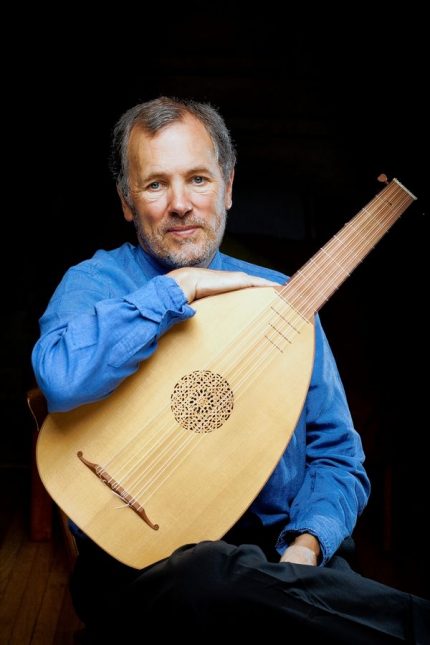Lutenist Nigel North brings grace, individuality to 16th-century songs

A pop hit one day, an esteemed classical work four centuries later.
Such was the premise of English lutenist Nigel North’s recital Sunday afternoon at the Reva and David Logan Center for the Arts, presented by UChicago Presents.
North’s program, titled “Douce Memoire: Sixteenth Century Hits,” presented transcriptions of the most famous lieder, chansons, and madrigals of the era, with a few popular dance pieces thrown in. His program notes called these songs “the sixteenth-century equivalents of [Paul McCartney’s] ‘Yesterday.’”
The lutenist smartly grouped his chosen pieces in themed sets. One set featured straightforward arrangements of Jean Richafort’s “De mon triste de desplaisir” and Cipriano de Rore’s “Ancor che col partire,” followed by elaborate fantasias on these songs. Another, featuring Orlando di Lasso’s “Susanne un jour” and Thomas Crecquillon’s “Un gay bergier,” focused on female rejection of unwanted male advances. And so on.
North’s performance style in these pieces was entirely individual. He eschewed flashiness for gracefulness, preferring subdued dynamics and articulation. And yet he employed frequent and enormous shifts in tempo.
This combination of lyricism and elasticity, emphasizing poetry above all, was more reminiscent of early 20th-century Chopin performances, such as Alfred Cortot’s, than of anything by today’s early music specialists. It also made even the most literal transcriptions into something very unlike the originals: none of the songs is for unaccompanied solo voice, and only a soloist can be this free.
It is a testament to North’s musicality that this rubato didn’t lapse into vulgarity. Instead, it lent a great range of expression to some of the simplest melodies, such as Paul Hofhaimer’s “Nach Willen dein.”
North’s penchant for tempo manipulation was a liability only in a few of the dances, such as Julio Abondante’s “Bergamesca,” in which the underlying pulse was too disjointed for the sense of dance to persist.
North’s two most fluid, straightforward performances—of the “Passamezzo antico” of Adrian Le Roy and “John, Come Kiss Me Now” (composer unknown)—had charm and sparkle. They demonstrated how ably he could interpret this repertoire without relying on rubato.
“John, Come Kiss Me Now” and Albert de Rippe’s arrangement of Pierre Sandrin’s “Douce memoire” were among the few pieces in which North abandoned his dynamically restrained approach, employing more contrasts. Yet, these contrasts did not create drama, per se. Instead, the forte passages—full of grandeur rather than vigor—served to underscore how tender his pianissimos sounded by comparison.
Although North’s approach was generally melodically-] oriented, his performance of Lasso’s “Susanne un jour” showcased his ability to highlight particular voices within a polyphonic dialogue.
The official program ended with John Dowland’s “Lachrimae pavan.” But given the remarks in his program notes, it was fitting—albeit on-the-nose—that North’s true conclusion was playing “Yesterday” as an encore.
One might wish that the order were reversed, however. It would have been nice to “explain” McCartney in terms of Dowland, rather than vice versa—to give the sixteenth century the final word about its own music.
UChicago Presents’ next classical event is a streamed program by pianist Eugenia Jeong. The program will offer music by Korean, Syrian, and Israeli composers and be available from November 11- 18. chicagopresents.uchicago.edu
Posted in Performances




